 Paranoia is often stigmatized and narrowly viewed as a rare psychological break, but it is better understood as a common human experience resting on a broad spectrum of suspicion. At one end lies healthy vigilance; at the other, crippling delusion. For individuals navigating Borderline Personality Disorder (BPD), this suspicion is neither rare nor arbitrary; it becomes a terrifying, all-encompassing survival mechanism rooted in the intense, pervasive fear of abandonment. Understanding this link is crucial to compassionate clinical insight and effective treatment.
Paranoia is often stigmatized and narrowly viewed as a rare psychological break, but it is better understood as a common human experience resting on a broad spectrum of suspicion. At one end lies healthy vigilance; at the other, crippling delusion. For individuals navigating Borderline Personality Disorder (BPD), this suspicion is neither rare nor arbitrary; it becomes a terrifying, all-encompassing survival mechanism rooted in the intense, pervasive fear of abandonment. Understanding this link is crucial to compassionate clinical insight and effective treatment.
 Water has a thousand voices, and none of them sound the same. Sometimes it whispers, sometimes it roars, sometimes it hammers so insistently you can’t think straight. That, I suppose, is the gift of it—it’s never just one thing. A single drop can be soft enough to ease you into sleep or sharp enough to wake you in the middle of the night. A stream might murmur like a confidant, while a storm shouts with a force that shakes the windows. Each sound carries its own mood, its own small world, and when we pause to listen closely, even briefly, we can find reasons, however fragile, to be grateful.
Water has a thousand voices, and none of them sound the same. Sometimes it whispers, sometimes it roars, sometimes it hammers so insistently you can’t think straight. That, I suppose, is the gift of it—it’s never just one thing. A single drop can be soft enough to ease you into sleep or sharp enough to wake you in the middle of the night. A stream might murmur like a confidant, while a storm shouts with a force that shakes the windows. Each sound carries its own mood, its own small world, and when we pause to listen closely, even briefly, we can find reasons, however fragile, to be grateful.
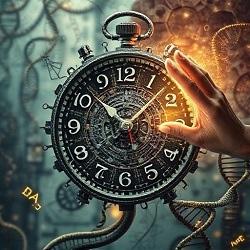 Aging is not merely the passage of time, but a fundamental biological process characterized by the gradual decline of cellular and tissue function. Central to this deterioration is the accumulation of aged, non-dividing cells known as senescent cells. These cells, eventually become detrimental, secreting inflammatory molecules that drive chronic disease and tissue dysfunction. The field of regenerative medicine has identified a revolutionary approach to combat this cellular decay: the conversion of these aging somatic cells into induced pluripotent stem cells (iPSCs), effectively “resetting” their biological clock.
Aging is not merely the passage of time, but a fundamental biological process characterized by the gradual decline of cellular and tissue function. Central to this deterioration is the accumulation of aged, non-dividing cells known as senescent cells. These cells, eventually become detrimental, secreting inflammatory molecules that drive chronic disease and tissue dysfunction. The field of regenerative medicine has identified a revolutionary approach to combat this cellular decay: the conversion of these aging somatic cells into induced pluripotent stem cells (iPSCs), effectively “resetting” their biological clock.
 Here's the thing about CRISPR—it's kind of like giving humanity a word processor for DNA, except the stakes are infinitely higher than correcting typos. We're at this peculiar historical moment where the technology exists to prevent cystic fibrosis, sickle cell disease, Huntington's, and countless other conditions before they even begin; but we're frozen in place, wrestling with whether we should just because we can. Note: I reject Fideism entirely and do not include it in this work. I also don't entertain ontological, cosmological, or teleological arguments tainted by myth, legend, or folklore.
Here's the thing about CRISPR—it's kind of like giving humanity a word processor for DNA, except the stakes are infinitely higher than correcting typos. We're at this peculiar historical moment where the technology exists to prevent cystic fibrosis, sickle cell disease, Huntington's, and countless other conditions before they even begin; but we're frozen in place, wrestling with whether we should just because we can. Note: I reject Fideism entirely and do not include it in this work. I also don't entertain ontological, cosmological, or teleological arguments tainted by myth, legend, or folklore.
 Thesis: It is hereby argued that the Mozilla Foundation errs in diverting resources, focus, and fundraising efforts towards initiatives such as the Responsible Computing Challenge and Common Voice. The Foundation's optimal, necessary, and most impactful role lies solely in the continued development, maintenance, and promotion of its core software products, primarily the Firefox web browser and related technologies. The recent $3.55 million USD funding gap for these non-software projects should not be filled through external appeals but should serve as a catalyst for strategic refocusing.
Thesis: It is hereby argued that the Mozilla Foundation errs in diverting resources, focus, and fundraising efforts towards initiatives such as the Responsible Computing Challenge and Common Voice. The Foundation's optimal, necessary, and most impactful role lies solely in the continued development, maintenance, and promotion of its core software products, primarily the Firefox web browser and related technologies. The recent $3.55 million USD funding gap for these non-software projects should not be filled through external appeals but should serve as a catalyst for strategic refocusing.
 The landscape of Christian theology contains doctrines that profoundly shape one's understanding of God, humanity, and salvation. Among the most debated and impactful is the Doctrine of Total Depravity. This doctrine posits a fundamental corruption of human nature due to the Fall, impacting our ability to choose good or respond to God apart from divine intervention. This disputation seeks to critically examine the doctrine, contrasting it with scriptural passages, philosophical arguments for agency, and the atheist critique, ultimately arguing for the primacy of human choice in matters of faith and morality.
The landscape of Christian theology contains doctrines that profoundly shape one's understanding of God, humanity, and salvation. Among the most debated and impactful is the Doctrine of Total Depravity. This doctrine posits a fundamental corruption of human nature due to the Fall, impacting our ability to choose good or respond to God apart from divine intervention. This disputation seeks to critically examine the doctrine, contrasting it with scriptural passages, philosophical arguments for agency, and the atheist critique, ultimately arguing for the primacy of human choice in matters of faith and morality.
 Let's not mince words: Dungeons & Dragons, the grandaddy of roleplaying games, is dying a slow, ignominious death. And the rot, I would argue, truly set in the moment Tactical Studies Rules (TSR) was gobbled up by Wizards of the Coast back in the late 90s. That was the turning point, the moment the soul of D&D began its migration from a passionate, player-centric game towards an over-commercialized "intellectual property" to be strip-mined for profit. Hasbro's subsequent stewardship has only accelerated this tragic decline, and the recent financial reports only serve as grim confirmation.
Let's not mince words: Dungeons & Dragons, the grandaddy of roleplaying games, is dying a slow, ignominious death. And the rot, I would argue, truly set in the moment Tactical Studies Rules (TSR) was gobbled up by Wizards of the Coast back in the late 90s. That was the turning point, the moment the soul of D&D began its migration from a passionate, player-centric game towards an over-commercialized "intellectual property" to be strip-mined for profit. Hasbro's subsequent stewardship has only accelerated this tragic decline, and the recent financial reports only serve as grim confirmation.
 Feeling a tug of concern when you heave a full trash bag to the curb? You're not alone. In a world increasingly grappling with overflowing landfills and plastic pollution, the idea of reducing the amount of waste we produce at home is gaining traction. Perhaps you've seen impressive images of people fitting a year's worth of trash into a small jar and thought, "That's impossible for me!" This article is about taking the first steps – simple, affordable changes you can implement right now in your own home to significantly reduce your waste footprint without feeling overwhelmed.
Feeling a tug of concern when you heave a full trash bag to the curb? You're not alone. In a world increasingly grappling with overflowing landfills and plastic pollution, the idea of reducing the amount of waste we produce at home is gaining traction. Perhaps you've seen impressive images of people fitting a year's worth of trash into a small jar and thought, "That's impossible for me!" This article is about taking the first steps – simple, affordable changes you can implement right now in your own home to significantly reduce your waste footprint without feeling overwhelmed.
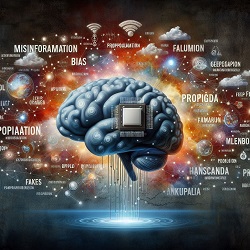 In the ever-evolving landscape of artificial intelligence, one crucial point remains steadfast: AI information can and often does contain inaccurate and unverifiable information. This poses a significant danger in our increasingly AI-driven world. Access to vast quantities of information presents both opportunities and challenges. While large language models offer an impressive information retrieval and synthesis, we must acknowledge a critical limitation:
In the ever-evolving landscape of artificial intelligence, one crucial point remains steadfast: AI information can and often does contain inaccurate and unverifiable information. This poses a significant danger in our increasingly AI-driven world. Access to vast quantities of information presents both opportunities and challenges. While large language models offer an impressive information retrieval and synthesis, we must acknowledge a critical limitation:
AI can and will provide misinformation. This is a call for awareness and caution.
 We all experience negative thoughts from time to time, and sometimes they can trigger strong emotions that affect our mood, behavior, and well-being. How can we manage these emotions in a healthy and effective way? In this post, we explore the concept of emotional regulation, a skill that helps us navigate the stormy seas of our feelings with mindfulness. We will learn how emotional regulation can help us calm our emotions, cope with negative thoughts, and cultivate a serenity that transcends the turmoil of the world.
We all experience negative thoughts from time to time, and sometimes they can trigger strong emotions that affect our mood, behavior, and well-being. How can we manage these emotions in a healthy and effective way? In this post, we explore the concept of emotional regulation, a skill that helps us navigate the stormy seas of our feelings with mindfulness. We will learn how emotional regulation can help us calm our emotions, cope with negative thoughts, and cultivate a serenity that transcends the turmoil of the world.
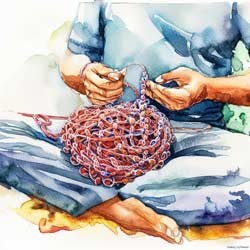 We all have thoughts that trouble us, that linger in our minds and refuse to go away. Sometimes, these thoughts can be overwhelming, causing us to feel anxious, depressed, or hopeless. How can we cope with these negative thoughts in a healthy and effective way? In this post, we will explore the concept of mindful coping, a technique that helps us navigate the labyrinth of our thoughts with balance and constructiveness. We will learn how mindful coping can help us improve our problem-solving skills, regulate our emotions, and transform our negativity into resilience.
We all have thoughts that trouble us, that linger in our minds and refuse to go away. Sometimes, these thoughts can be overwhelming, causing us to feel anxious, depressed, or hopeless. How can we cope with these negative thoughts in a healthy and effective way? In this post, we will explore the concept of mindful coping, a technique that helps us navigate the labyrinth of our thoughts with balance and constructiveness. We will learn how mindful coping can help us improve our problem-solving skills, regulate our emotions, and transform our negativity into resilience.
 We all have thoughts and feelings that we sometimes wish we could get rid of. We may try to fight them, ignore them, or judge them, but they often come back stronger and more persistent. What if there was a better way to deal with them? A way that could bring us peace and harmony instead of conflict and suffering? In this blog post, we will explore the art of acceptance, a mindfulness practice that teaches us how to embrace our humanity and all its facets.
We all have thoughts and feelings that we sometimes wish we could get rid of. We may try to fight them, ignore them, or judge them, but they often come back stronger and more persistent. What if there was a better way to deal with them? A way that could bring us peace and harmony instead of conflict and suffering? In this blog post, we will explore the art of acceptance, a mindfulness practice that teaches us how to embrace our humanity and all its facets.
 In the vast tapestry of mindfulness, we uncover the delicate art of redirection—a subtle yet transformative practice that holds the power to reshape our connection with persistent, nagging thoughts. It is akin to shifting the spotlight from a dimly lit stage onto one brilliantly illuminated, where the shadows of negativity lose their menacing grip. This sub-practice, though seemingly subtle, wields transformative power, capable of fundamentally reshaping our relationship with those persistent and nagging thoughts that often haunt our mental spaces.
In the vast tapestry of mindfulness, we uncover the delicate art of redirection—a subtle yet transformative practice that holds the power to reshape our connection with persistent, nagging thoughts. It is akin to shifting the spotlight from a dimly lit stage onto one brilliantly illuminated, where the shadows of negativity lose their menacing grip. This sub-practice, though seemingly subtle, wields transformative power, capable of fundamentally reshaping our relationship with those persistent and nagging thoughts that often haunt our mental spaces.
 Mindfulness, dear travelers of the soul, graces us with the power of reduced reactivity. In the whirlwind of life, negative thoughts often become sirens, luring us into impulsive reactions. But mindfulness bestows upon us a precious pause, like a sturdy anchor amidst turbulent waters. With this pause, we can assess our thoughts, deciding whether they deserve our precious attention or if they are but fleeting clouds in the boundless sky of our consciousness. This, my friends, is the serene calm in the midst of the storm, the gift of reduced reactivity that empowers us to choose our path with wisdom.
Mindfulness, dear travelers of the soul, graces us with the power of reduced reactivity. In the whirlwind of life, negative thoughts often become sirens, luring us into impulsive reactions. But mindfulness bestows upon us a precious pause, like a sturdy anchor amidst turbulent waters. With this pause, we can assess our thoughts, deciding whether they deserve our precious attention or if they are but fleeting clouds in the boundless sky of our consciousness. This, my friends, is the serene calm in the midst of the storm, the gift of reduced reactivity that empowers us to choose our path with wisdom.
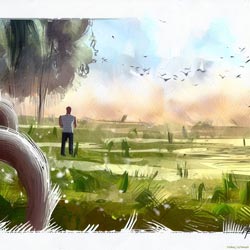 In the theater of our minds, we often find ourselves caught in the relentless drama of thoughts. Yet, mindfulness extends to us a precious gift: the art of creating space. Imagine, if you will, a stage with a pause, a breath, a silence before the next act. This space is crucial, for it liberates us from being mere actors bound to a script. In this intermission, we gain the freedom to choose how we respond to the thoughts that parade before us, breaking free from the shackles of automatic reaction.
In the theater of our minds, we often find ourselves caught in the relentless drama of thoughts. Yet, mindfulness extends to us a precious gift: the art of creating space. Imagine, if you will, a stage with a pause, a breath, a silence before the next act. This space is crucial, for it liberates us from being mere actors bound to a script. In this intermission, we gain the freedom to choose how we respond to the thoughts that parade before us, breaking free from the shackles of automatic reaction.
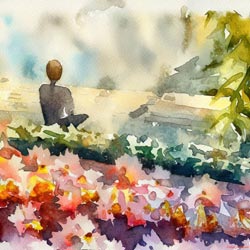 As we walk this path of mindfulness, let us contemplate the art of non-judgmental observation. In the garden of our thoughts, we often hastily label the blooms as 'good' or 'bad.' But my friends, true mindfulness encourages us to be like a gardener who merely observes the flowers without judgment. In doing so, we untangle ourselves from the thorny judgments that give power to our thoughts. Instead, we hold them gently, like fragile petals in our hands, understanding that they do not define our worth.
As we walk this path of mindfulness, let us contemplate the art of non-judgmental observation. In the garden of our thoughts, we often hastily label the blooms as 'good' or 'bad.' But my friends, true mindfulness encourages us to be like a gardener who merely observes the flowers without judgment. In doing so, we untangle ourselves from the thorny judgments that give power to our thoughts. Instead, we hold them gently, like fragile petals in our hands, understanding that they do not define our worth.
- Increased Awareness - Dawning of Inner Light
- Judicial Ethics - Supreme Court in Crisis
- Autocracy
- The Judicial Conference
- I Expect Better From My Neighbor
- Constitutional Interpretation
- The Nature of Reality - Twelve Perspectives
- René Descartes, The Cartesian Legacy
- Borderline Personality Disorder (BPD)
- Game Theory, An Introduction






